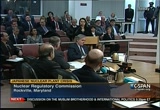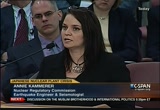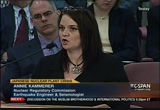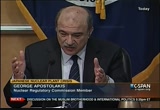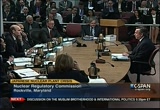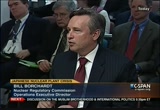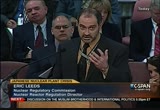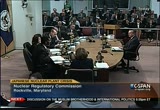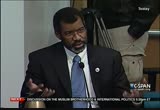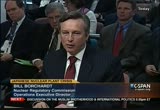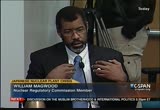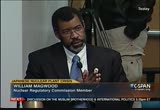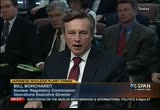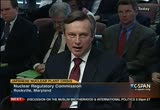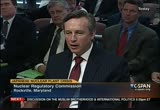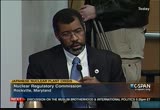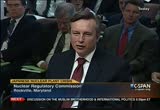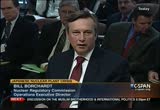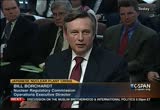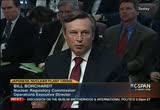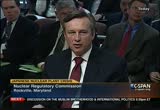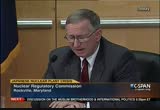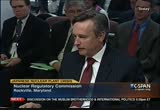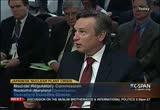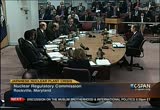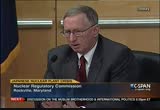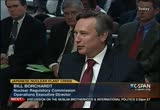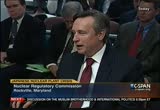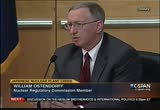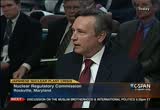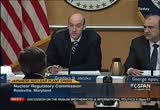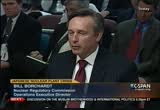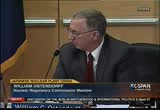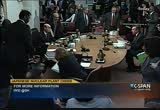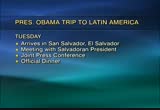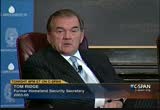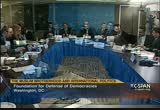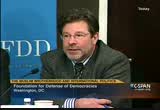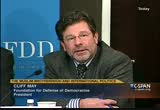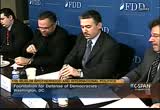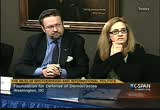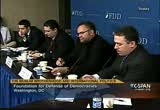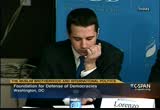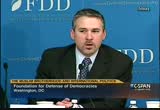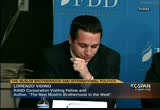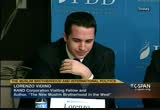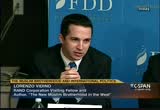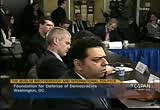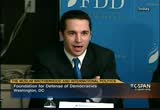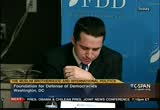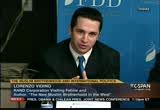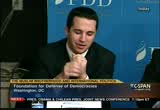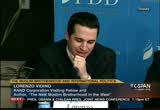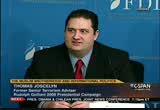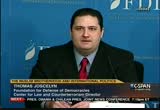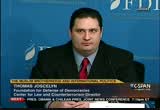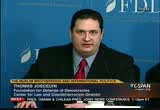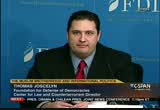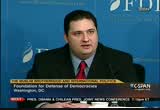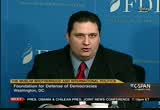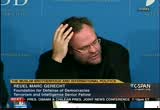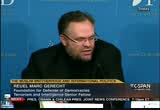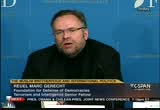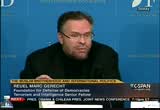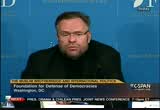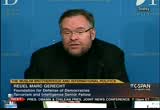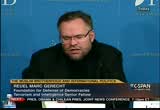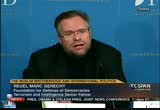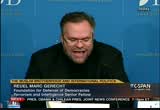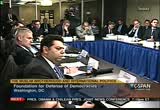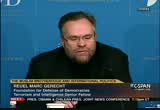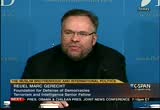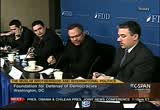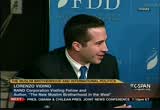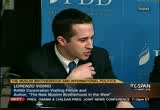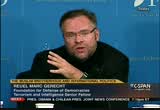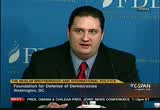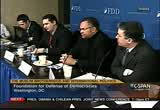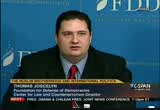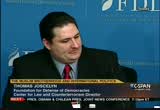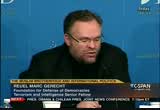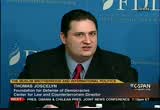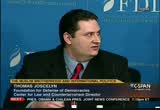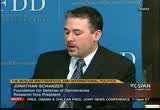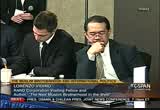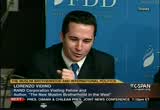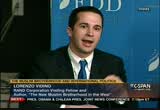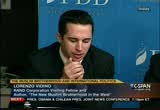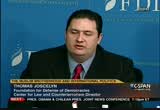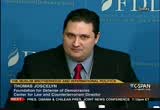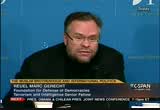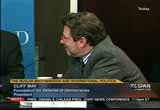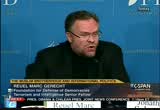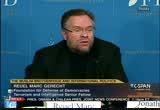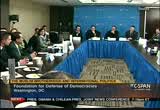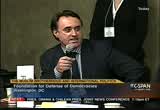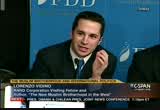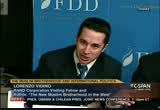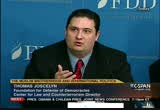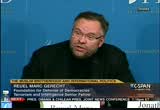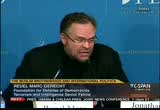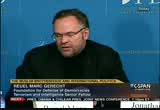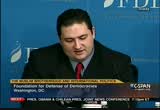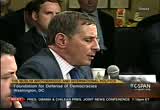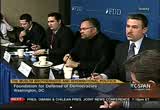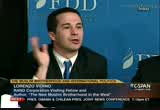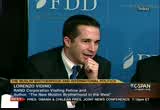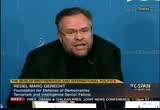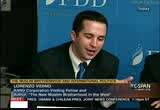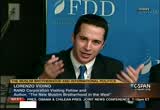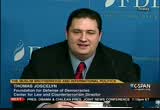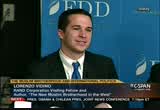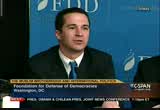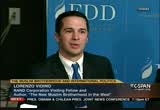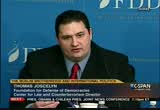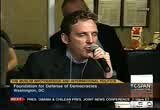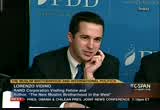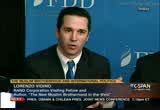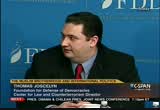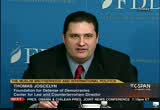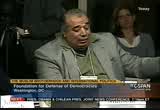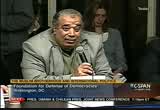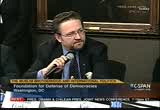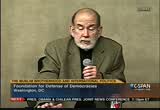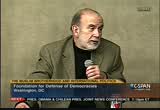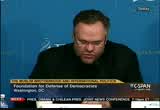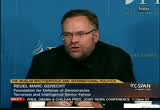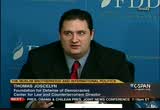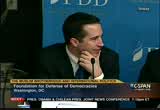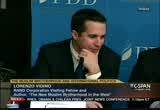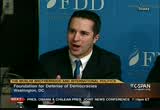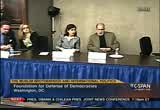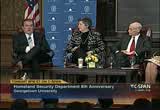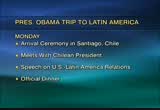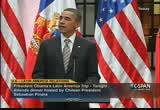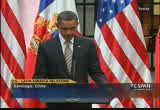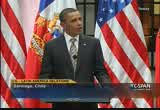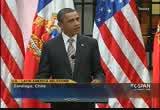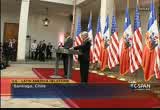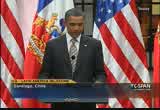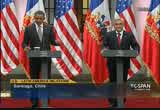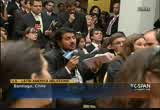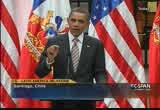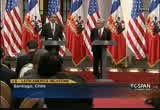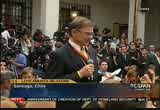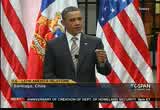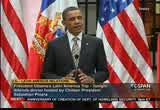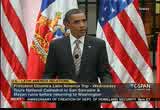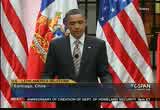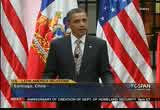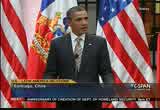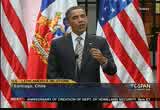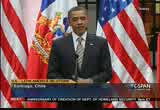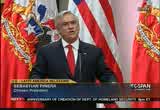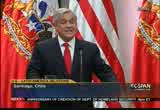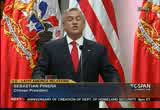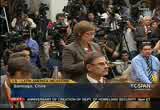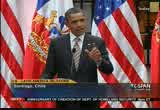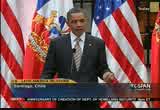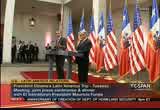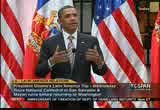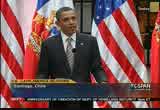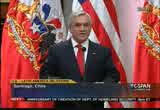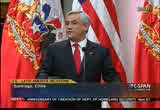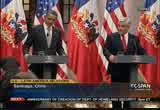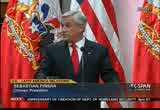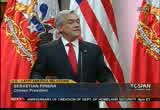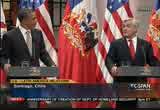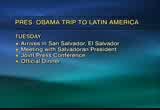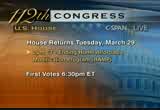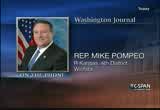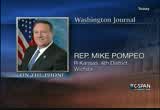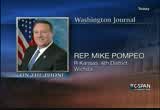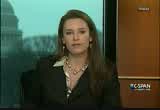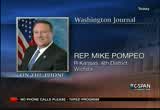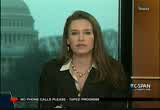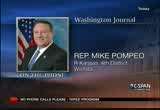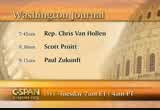tv U.S. House of Representatives CSPAN March 21, 2011 5:00pm-8:00pm EDT
5:00 pm
united states. as mentioned, we are thinking of undertaking issue 199, looking at the potential impact to assess risks given the perceived increase in ground motion hazards. initiated by the new usgs seismic counter mappingit is imt when the modern analysis techniques are used, there probabilistic techniques. those of the basis of the maps. they account for basically all sources and the potential for all the different magnitudes that are capable of those sources. up to and including maximum magnitude evens, which in many cases exceed that which we have seen in the historic record. it was mentioned that the most widely felt earthquakes in the u.s. work i 18 -- were in 1811
5:01 pm
and 1812, and we believe it was about a magnitude 7. again, we look at the potential for exceeding that. we all sort of for the likelihood that that event occurs. that also accounts for background seismicity, which is common in the east, which is seismicity which cannot be attributed to a specific fault. it is important to note that seismicity and the central and eastern u.s. tends to be in what we call seismic zones. which are not directly attributable to faults. and we account for all of the hazard in the seismic zones. one of the questions which has come up repeatedly is how many plants are near faults or how many plants are in moderate or high seismicity regions. and that is a very challenging question to answer, because these seismic zones are not well-defined boundaries. the faults that were the
5:02 pm
positive faults of the 1811 and 1812 earthquakes have never been identified. in part, because they are under the deep sediments of mississippi. so we have to account for the uncertainty in the locations. we have to account for the answer and involved in the magnitudes. and all of that is incorporated in the hazard analysis that we undertake. the generic issue program is using the most state of the art types of analyses, we do get earthquakes and include earthquakes be on the design basis. in that way, we directly account for those potential sources and those potential earthquakes, which are not under our current licensing basis, and we're currently assessing the risks of those possible beyond design basis events. >> thank you for that.
5:03 pm
>> i would like to make one comment and then ask my last question. annie mentioned probabilities. even after we do the analysis, we still have depth in mind and a different way of looking at these. it is not just what is the most likely event we anticipate. we always ask that question that was mentioned -- what if we are wrong? and we take additional measures. that is very important for people do understand. probability is sometimes easy to attack. one last question. thank you. as you mentioned, the damage in fukushima was not really caused by the earthquake. it was the tsunami that came afterwards. so the question now is, when we license our plants here, are we
5:04 pm
considering this one-two punch? reconsidering an earthquake followed by a tsunami as appropriate or a major fire or flood? because of water beth fell years. because this secondary event seems to be now very important, and we have to account for it. so how do we approach this issue in the united states? >> the design basis includes many different analyses. i would say one thing about the earthquake in japan. we do not know what the impacts of the earthquake are inside of the reactor building specifically. that is our most the equivalent -- equipment of interest to us would be located. it may have survived perfectly well and state perfectly functional, or there may be damage that we just do not know about. we need to see what the inspection results are once they
5:05 pm
have access to the plant. but our reviews for the u.s. include -- it is always very site-specific. for earthquakes, if you're in a very soft soil environment, there is not a very challenging review that is required or analysis that is required on earthquakes. but it might be that you need a storm surge for a hurricane or a storm surge for a tsunami. you do not take every possible current dividend and pile them all together into one evened, so it has done more on and isn't it-by-event basis. >> i think it is more generally, how do we consider separate
5:06 pm
design bases events -- and do we consider design basis events separately or do we consider all the design basis events continuously on a plan? >> i am director of the office of nuclear reactor regulation. we take into account whatever natural phenomenon that can occur at a particular site. whether it is a hurricane, tsunami, earthquake, a tornado, what have you, and we have them analyzed site-specifically. i am not sure i understand the question directly. i you asking about a seismic event followed by a tsunami? we analyze for tsunami. we analyze for the maximum storm surge, as mr. bill borchardt mentioned, and also what kind of run out what happened. typically, tsunamis are triggered by an earthquake. so we would analyze for that. we have done that for our plans
5:07 pm
on the coast. >> thank you. and i would just echoed those comments. we are at a very early stage now, too, and detailed information is probably going to be some time until we have it. so the exact impact of the tsunami and/or the earthquake and what their effects on the plant are will probably still take some time to understand. commissioner. >> thank you. good morning. did you get some sleep this weekend? >> not much. >> you'll get there at some point. there has been a lot of discussion in the media about comparing what is happening in japan to three mile island. as i look at this, and we're still early in this, i tend not to think as much about three mile island as i do 9/11. one reason i think about that is because it seems to me that there are certainly a lot of
5:08 pm
lessons learned, a lot of technical details left to sort out over time. but i wonder also, whether, as in the case of 9/11, is there a major conceptual ah-hah that is sitting out there in front of us? i want to make sure we do not miss that. in the case of 9/11 it was not simply that we need to do a better job protecting airplane cockpits and lots of the security of grades. there was a conceptual ah =-hah that the threat was a lot different than we thought it was. at this early stage, do you see a bigger message out there that we should be thinking about? >> i do not see a significant weakness now, but that is why we need to do this quick-look review. and my personal view is that whatee need to do is take some of very experienced people that are both within the staff and maybe take some even recently
5:09 pm
retired people that have expertise in broad areas of design, review, and licensing and to let them just focus on the question of, is there something here that causes us to question the way we have applied defense and being risk- informed, and the various barriers of radiation released protection and those kinds of things, and evaluate whether or not there is something different that needs to be done. it has not actually occurred to me. if anything, it has given me a bit of a confidence, if you will, that all of those redundancies and all of our processes are paying off. i mean, it was maybe in the view of some stakeholders overly conservative, the way we have approached it, but i think we
5:10 pm
are seeing the value and benefit of that approach that we have used for the last 35 years. >> i appreciate that and agree with that. that may give you sort of some thoughts about where i think there might be some larger issues to think about. and that is in looking at, as we describe -- again, we do not know what the details, but we do have the sense that the plant, you know, seemed to survived the earthquake. and we do have the sense that disabling of's the backup power systems led to the situation. but even beyond that, there is the fact that there is so much difficulty in bringing resources to the plant to recover from that situation. when you look at our plans, we certainly have done things in b5b and other things to upgrade our ability to recover from site
5:11 pm
black out. we're looking at those issues. but if you lose a lot of infrastructure, if you lose the ability to get to a site, you lose hundreds of miles of transmission line, if you lose the ability to have rail transport to move equipment around, that is something i do not know that there has been a lot of thought about. i wonder if you can reflect on that for a moment. because when i look at this event, i see a significant struggle, especially over the early part of this, to get the right resources to the plant to be able to recover from this accident. today, we're still struggling to put up ac power to units one and two. when you think about this, and we will be looking at it in great detail going forward, do we even have the regulatory scope to cover all the ground that needs to be covered to ensure that the infrastructure is in place to be able to recover from an accident like
5:12 pm
this? >> i think there is a couple of calls i would like to touch on in response to that question. the first is, and i have no idea what the situation is in japan regarding their regulations and what they had in place, so i am not implying whether they had or did not have these kinds of things. but in the united states, i mentioned the station blackout rule, which was -- is a rule that requires an analysis of what would happen at a plant and its coping strategy for dealing with a complete loss of all ac power. so that assumes that you lose the transmission lines and the diesels do not start. and then they have to do an evaluation, a coping steady, of how they would be able to restart the plant. that has resulted in various approaches at different sites. some have a gas turbines and
5:13 pm
that is on the site that could be very quickly hooked up into the plant. there are others that have nine safety-related generators. there are plants that have these all fire pumps so that there is a back up to a back up to lay back a way to inject water into the core. there is a regulatory construct that is required and mandated. on the u.s. government perspective coming out of 9/11, we had the department of common security, which is positioned to orchestrate the entire federal response to any event of magnitude that you might be suggesting. that would happen so that the full resources of the u.s. government would be able to use
5:14 pm
different resources to get temporary equipment to a site in order to provide electrical power, a temporary diesel generators, that kind of thing. the backstop for all of that, and i am now leaving the kind of a federal regulatory requirement perspective, is that the u.s. industry i think is unique in the world, but also within the industry in this country, in that while on the one hand, they are competitors. on the other hand, they share operating experience. they have programs that they all contribute to. and they have an inventory of spare cards and equipment that could be very quickly brought to bear in responding to this kind of an event. this is up side the regulatory purview, i want to make clear, but that is yet another backstop that would help a site that had
5:15 pm
a similar kind of problem, respond to it in a quick and effective manner. >> appreciate that. let me also add go you're somewhat positive words about the industry -- let me echo you're somewhat positive words about the industry. i think the industry has responded very well to this. i particularly congratulate the efforts on working with international partners and to take positive action in the united states. i think a good job has been done. at the individual companies have done a lot. i congratulate the industry for reacting that way. than me move on to a little bit different subject. we have talked a little bit about hydrogen already this morning and the measures we have to deal with hydrogen. is it your understanding that
5:16 pm
all the hydrogen led to the explosions came from spent fuel? >> i would not want to hazard a guess. it is certainly a likely source. whether it is all of it or not, i cannot guess. >> i want to give you a chance to give a more holistic response to this. what measures are in place to prevent hydrogen from collecting and exploding in u.s. plants? >> the hardened vent -- of course, the u.s. design approach is to protect the containment. to ensure the integrity of the containment. if you can do that, even if you have fuel damage, you can prevent the uncontrolled release of radioactive materials into the environment. three mile island, for example, had cord damage, a significant amount of core damage. yet, the radiological releases were very limited from three mile island.
5:17 pm
so there was negligible health affect from that accident. the heart invents would allow the primary containment to stay intact, and that is probably the single most important thing. the other thing to maintain the containment for this design, we have required in their dignity containment. so it is filled with nitrogen. if you do not have oxygen in the containment, even if you did have hydrogen in there, you not have an explosion or fire. those are probably the two biggest ones. >> one more question. just to give you a chance to clarify, there has been a lot of chatter in the press over the weekend about the impact of 50-
5:18 pm
mile evacuation zones around u.s. nuclear plants. could you sort of give the nrc's position on what the emerging seen planning requirements are and what we have today? >> as part of the emergency preparedness construct in this country, we have a 10-mile emergency planning zone, completely encircles every reactor plant in the country. that is in coordination with f ema, who has an off site emergency preparedness role throughout the country, and is routinely practiced. we have models that would do an analysis of what the release paths are. we take into account the meteorological conditions. and the nrc does not make the recommendations regarding evacuation or any other protective action guidelines.
5:19 pm
that is the responsibility of the state government. it would be the governor that would ultimately be making that decision. but we are in a decision to provide an independent assessment and advice to the governor in those kinds of circumstances. the situation that led to the 50-mile guidance in japan was based upon what we understood and still believe existed, that there was degraded conditions in two spent fuel pools that the site, and in all likelihood, some cord damage in three of their reactor units. based on the situation as we understood it at that time, we thought it was prudent to provide the recommendation to the ambassador to evacuate out to 50 miles in japan. it was not based on the existing radiological conditions but what at that time
5:20 pm
was a possibility. so we thought it was the prudent, conservative suggestion. if those conditions existed in the united states, we would have made the exact same recommendation. the idea that there might be some misunderstanding that because we have a 10-mile epz, that would be the extent to what we would consider and our emergency plan and recommendations would be limited to, is not true at all. we would have done the exact same analysis and gone through the same thought process to consider extending evacuation or what ever protective measures we thought were appropriate. >> thank you. >> thank you. bill, thank you for your leadership and for the hard work and professionalism of your teams. it was helpful in your opening statement or you talk about the history of the nrc post-three
5:21 pm
mile island, post-9/11 as to what steps are measures were considered and were implemented. i think that history is very relevant to near term and a longer-term efforts. certainly, various hurricanes, andrew, katrina that this country has faced also provide data points for various steps taken, whether they be specific to the nuclear field or external to the nuclear field. does any of the experience from your career at nrc, do you have any significant lessons learned from the process? not the substantive technical details, but the process deployed following other significant events that would help inform the task force and execution of its mission? >> i think it is very important that the task force keep a broad
5:22 pm
perspective of the regulatory framework that exists within the nrc and the legal framework that exists within the united states. because there is a temptation to, i think, andc tried to pile in every good idea that exists into something that becomes unmanageable. and the ultimate could actually end up being counterproductive to safety. there was a degree of that in my opinion proposal, only speaking of my personal opinion, after three mile island. when i started with the agency in 1983, we were still in the midst of following of the actions of three mile island. it was a new regulation, and anybody started nrc in started -- who started here has the number burned into their brain. some of the fixes that i alluded
5:23 pm
to were absolutely instrumental in improving the safety in this country. some are, i believe, actually -- if we had carried them all out, might have actually been counterproductive in a way. not contributing to safety. they might have been a good idea in somebody's mind. so there needs to be -- after you go to the brainstorming and identification of all things that could change, i think there needs to be a good and thorough evaluation of what the right thing to do is and in what kind of sequence and then what kind of timing. >> ok. i will make two comments on that. one thing, just for information, you maybe aware of this, but about a year ago the national academy undertook a significant study for about nine or 10 federal agencies to look at disaster resilience in this country, specifically from the context of interagency coordination, rolls, and
5:24 pm
responsibilities. nothing there is currently nuclear specific to my knowledge. the extent of interagency coordination for various types of events in this country is a prime subject of that study. there may be some value at looking at that. and on the transportation logistics report, i agree that there have been issues so far. in this response, one might take note in the department of defense's efforts, since 1963, there has been a very operationally ready deep submergence rescue vehicle, dsrv, on standby close to airplanes on the east and west coast of the u.s. to provide a response. the point is, other agencies have gone through similar analogs and are looking at how they might deal with particular responses. that is something just to note.
5:25 pm
also, a kind of staying on the big picture, the historical nature of some of the nrc responses to these big events, it also strikes me that perhaps the audience to the recipients of these reports will be representing a broader cross section than typical commission meetings. we have nuclear industry. we have many of the same stakeholders from issue to issue. but my personal opinion is that this is one where how we communicate to the person who does not have a stake in industry or is not part of one of the normal stakeholder groups but also deserves and needs to receive a reply that they can understand is really essential. is there any thing from your experience at the nrc, either
5:26 pm
9/11 or the 2003 black out, that can help communicate to the american public the results of these efforts? >> again, this is my assessment, i think that, especially in the long term review that we do, we need to build in a meaningful engagement with all the stakeholders. they have an enormous capability to understand the most technical issues. sometimes we think that capability in this not exist, but that is not true. we have had enormously valuable input from a wide range of stakeholders. this is a little bit off of that response. but when we established the reactor oversight program, we read it 10 or 12 years ago, we used just the kind of approach. we brought in all kinds of different stakeholders from all different perspectives.
5:27 pm
it was a very impressive end result that had everyone's buy- in, people who came from pronuclear and anti-nuclear, and they all agree that this was a good approach to regulatory oversight. i think the same kind of mind- set is important to get into this long-term activity. and start at the beginning, you know, where we get into trouble as a regulator is one we have our mind made up. or even if we do not, there's a perception we already have our mind made up. and then we begin the engagement. so i think we need to do it right from the very beginning. it would have to be very open and transparent in the process. >> thank you. the chairman indicated in his comments earlier that there is much we do not know. it will be some time before we have a lot of the details of what happened at fukushima. there is one area that do want to ask you about.
5:28 pm
i have spent very little time looking at spent fuel pools. when i visit a planned, i will go see the pool. i have probably seen four in the last year. but i do not have much background at all in its spent fuel pools. i recognize that investment has focused concerns over the last 10 days, and perhaps compared to our discussions about emergency cooling systems and gsi 191 and other issues that we do not spend a lot of time talking about as a commission, is there any initial area of u.s. reactor plant spent fuel configuration or operation that comes to your mind as warranty in particular exploration in this task force? >> well, clearly, it is a very simple problem. all you have to do is keep water in the pool.
5:29 pm
the pool is an open vessel. the only objective is to keep water in it. even if in a bad situation it were to heat up and you have boiling water in there, as long as he kept the fuel covered with water, you can prevent the high radiological release. i think what the task force needs to do is to go down the specifics of what happened in japan and then evaluated that to make sure that, in fact, these things that we put into place after 9/11, for example, really would work under that scenario. we have thought about things like making sure that the equal of men you are going to use when not be damaged in the event that caused the first problem -- making sure that the equipment would not be damaged. you cannot say exactly where it would be used. there have to be staging areas. on a tsunami or flooding issues, you would not want the clement
5:30 pm
stored outside, because it would be swept away. it is another what-if that will help us explore and probe with the various scenarios are and to make sure we have the most -- the highest probability of success. i think that is really the box we need people to be banking on. >> thank you. what is i ask at this point if there are any of the questions that my colleagues have. at this point -- >> actually, yes. [laughter] a do want to take a moment and thank all the people at the response center. we are doing our best to have a rotation of people in and out of that, but they are working very long hours. they are still doing their real job, too. that has got to be our first
5:31 pm
priority. but i want to make special note of the team that volunteered to go to japan on no notice that have been working incredibly long, hard hours, working in a way that there is no operating procedure to operate. chuck happens to be the team leader, but there are many people and have worked very hard. we have sent another person and over to help chuck in that team leader role. and there is another wave of employees that have volunteered and they will be leaving, i think, tomorrow. the last group will leave on thursday. i want to make special note of their command and professionalism. thank you. >> thank you. they will appreciate that, and your work, as notice.
5:32 pm
-- as noted. we have captured some of these ideas before it got to move forward and i in courage that we capture them as quickly as possible. does anyone else have a comment on the matters and issues in front of us? >> adis thank you for commune -- convening this meeting today. i know it is helpful. we're looking forward to taking the actions we need to take. >> ok, again, and want to thank everybody for their efforts so far. a one to close with that as many people on this side have indicated hamas we have had very close relationships with colleagues in japan -- have indicated, we have had very close religious of colleagues in japan. this has been very difficult --
5:33 pm
very close relationships with colleagues in japan. this has been very difficult and we will continue to work together. this is likely the first of many discussions we will have on this topic and we look forward to having -- to continuing this discussion and continuing our help on this important mission. with that, we are adjourned. thank you. [captioning performed by national captioning institute] [captions copyright national cable satellite corp. 2011]
5:34 pm
>> president obama is midway through a trip to latin america. speaking in chile today, president said that latin america is an example of those in middle east fighting for democracy. tomorrow he travels to allow salvador, where he will hold a joint press conference with the salvadoran president. and on wednesday, he will tour mayan ruins in the national cathedral in san salvador before returning to washington. >> tonight on c-span, marking the eighth anniversary of the
5:35 pm
department of homeland security with former secretary tom ridge and michael chertoff and current secretary janet nepalitano. they discuss the structure of the agency and what they miss most about the job. >> people have asked me, is being secretary, and to a certain extent i stake my guess. i miss working with people -- i say, yes. i miss working with people who addressed and it was very intense, but an exciting time. ines not knowing. i mean, not that everything we read every morning, michael, or janet, was something you would want to run home and talk to your kids about, but you do is not knowing. >> the secretary tom ridge, michael chertoff, and janet nepalitano discussed the department of homeland security tonight at 8:00 p.m. eastern on c-span. >> the egyptian voters went to
5:36 pm
the polls on saturday and approved constitutional changes to put the country on the path for parliamentary elections later this year. on the role of -- a discussion on the role of the group the muslim brotherhood and what it means to politics. this is 19 minutes. -- 90 minutes. imports good morning, a buddy, we will get started. i am the president -- >> good morning, everybody. we will get started. i am the president and we will welcome you to this expert briefing. this morning we will discuss the muslim brotherhood, its ideology, its goals, its strength in egypt and iran the world and the challenge as close to u.s. foreign policy.
5:37 pm
this briefing is part of a series here at std that brings together area experts to have a thoughtful, effective, and civil conversation about the international development and challenges and crises we face. we are honored to have with those representatives from the u.s. government, from the diplomatic corps, from any number of think tanks in town and other people from the policy community. as most of you know, the foundation for the defense of democracies was created just dr. 9/11 to do research on terrorism and the ideologies and regimes -- to do research on 9/11 -- was created just after 911 to do
5:38 pm
research on terrorism and the ideologies and regimes of those who declare themselves our enemies. those at ftd do not agree on everything. we do agree, however, net at least three fundamental principles -- no one should be deprived of basic rights, minority rights, women's rights, and religious freedoms, and they have an obligation to defend themselves and one another. and terrorism -- the terrorist use of violence to achieve its objectives is always wrong and should be condemned. our moderator this morning is my colleague, dr. paulick -- is my colleague, dr. jonathan at shanzer. he is the author of many books, and the co-author of the newly
5:39 pm
published book about palestinians and social media. he holds a doctorate from king's college, london. he documented the history of the united states congress and its efforts to combat terrorism. let me remind everybody to turn off their cell phones, or at least put them on vibrate. i will turn it over to john, who will introduce our speakers. >> thank you, cliff, and thank you ever before coming today. the reason why we are all here today is because we are witnessing profound change across the middle east. i think the initial conversations we have had here at fdd have been prompted by the changes we have seen in egypt with the fall of mubarak last month and have prompted discussion here about to what
5:40 pm
extent he could take prior -- power in egypt. -- we're also watching brain but we are not the ones watching egypt. bahrain is also watching eagerly, as well as jordan and as other splinter groups seek to gain power. we are seeing not only the traditional mother -- problem -- muslim brotherhood taking power, but others taking power across the middle east. as we are here to discuss what we might expect to do in the future and, certainly, we should be looking at in terms of u.s. policy. to my right is a senior fellow here at fdd.
5:41 pm
me is the former specialist at the cia operations. he is also an author. he has worked at new american enterprises. he has published just about everywhere. he was educated at johns hopkins university, the university of edinburgh, the american university in cairo and princeton. then we have tom joscelyn, also a senior fellow bureaucrats fdd. he is from the center for counter-terrorism and the senior editor for the war journal. he began an extensive review of 10,000 pages of the classified documents from guantanamo bay and has created a data base and has since published 100 articles on current and former guantanamo detainees.
5:42 pm
he is also an author. and recently, tom put together a tremendous white paper on the muslim brotherhood for senior leaders and it has been circulating a round the capitol hill. it is now turning into a monograph. we hope that our discussion today can influence the final product. and finally, we have lorenzo's, a visiting -- we have lorenzo, a visiting fellow at the lorenda -- lauren university. and he holds a doctorate in the international school of diplomacy at fletcher. that is our panel for today. it the way with this will go is we will ask each of our
5:43 pm
panelists, beginning with lorenzo, to speak for about five minutes to cover some of our thoughts about the muslim brotherhood and its rise in the middle east and thoughts they have about what we are seen. after one is done we will open this up to a broader discussion. if you do have a question, just turn your cocker by this and i will call on you and we will make sure you get a microphone. with that, i thank you very much. >> we had a very important referendum on saturday and the results clearly favor the brotherhood. the yes vote will lead to a change in leadership in the next
5:44 pm
six months. whether the egyptian vote for a yes was more of an emotional desire for immediate change, or whether they voted in favor of the brotherhood, that is debatable at this point. despite that, there is no question that the brotherhood victory on saturday will mean a more board world in egyptian political life. -- a more important role in the egyptian political life. according to all the people i have talked to, their campaign for the "yes" vote did a focus in two categories.
5:45 pm
the brotherhood focused itself on the countryside, the provinces. that is where the pro-democracy forces are so prominent and the west is not the prominent. the brotherhood knows exactly where its constituency is and where its strength lies. probably the brotherhood will have a larger role. what could be the problems that the brotherhood will face, let's say, in six months? the problem with the scene of the brotherhood as an almighty, a monolithic force does not take into consideration some issues with in the brotherhood. it is unfair to overplay them, but it is unquestionable that
5:46 pm
there are some divisions inside the brotherhood. for a long time, the glue that kept them together -- it is not unreasonable to think that this will develop in reasonable ways. i would divide the egyptian brotherhood into three generations. we have the old guard, the people who suffered persecution in the 1960's, the people that were jailed. it is really people now in their late sixties, seventies, and '80s. -- 80's. the old guard still controls, pretty much, the organization. we have a second guard, which is the people who mostly became members of the brotherhood in and 1970's, during sadat's
5:47 pm
move.s this generation at least speaks the rights of democracy. it is not necessarily genuine, but they talk a good game. let's put it like that. then we have a third generation. this third-generation in many ways is also in line, for the most part, with the second generation. there are conflicts there. some of them are simply power struggles. the criticism is that the first generation does not allow the second in the driving force to
5:48 pm
direct the group. to some degree, i think there are ideological problems. the second and third generation takes approaches, at least publicly, that are different from the first generation. it is very difficult for people from the outside to understand how it plays out. the first generation is the one that is gaining the upper hand, to some degree. we saw that in the platform of the brother of president in 2007. there was clearly a struggle between the first and second generation. the bottom line is that some key positions, the position of copps and women, whether laws should
5:49 pm
be vetted by a certain body of sharia experts, the position of the first generation was the one that dominated. this is probably going to play out in different ways. it is not reasonable to think of it as a certain split. we saw that in the 1990's. but will it go that direction? we do not know. we have seen that the first generation controls most of the power, but there is some, at least, some discontent with this second and a third-generation. the second point that is completely disconnected -- i was trying to make a -- an elegant, transition, but i cannot. the second point that john tuolomne to take was to talk about the old brotherhood. there was a lot of talk, but not a lot of clarity. i think it is fair to say that there is an international structure, a body.
5:50 pm
but that body does not really have control over the different options, branches, call them what you will. i think it is fair to say that in some 70, 80 countries throughout the west and throughout the united states, we have an accord -- an organization that has the financial and mostly, i would take a more ideological ties to the muslim brotherhood in other countries. -- and i would say, in what i'lideological ties to the muslm brotherhood and other countries. they towed the same lines, work the same issues, have the same talking points. nevertheless, each one is better positioned to understand the local dynamics.
5:51 pm
and achieve their goals. there is a global vision that is very similar, but it would be unrealistic to think that the brotherhood offshoot in yemen would have the same goals of the brotherhood of shoot in sweden. their realities are completely different. this network is, i think, at least looking to turkey as a very, very important model. there is no question that the akp has become, at least publicly, sort of the model for a lot of these organizations. this is up to gather interest in egypt and tunisia, but in other countries as well. many are going to turkey to see their successes. and they're claiming that the way to turn to media and egypt
5:52 pm
and other countries is to follow the turkey model. that is feasible to some degree. that is, they may want to do that. but i think there are significant differences. and when people talk about applying the turkish model to egypt, for example, there are some examples that make me skeptical. there are some enormous differences between egyptian and turkish society with the turkish experience with democracy and the secularism that is nonexistent in egypt. secondly, the akp, has nevertheless, the ball. and has moved away from the old guard. the egyptian muslim brotherhood has not done that. we are still 15 to 20 years behind what is the turkish
5:53 pm
evolution. that is the big difference between egypt and turkey. i'm probably pass my five minutes. i will stop there. >> thanks to a cliff and don for putting this on. i come at this from a bit different perspective. i come at this as a terrorism analyst who basically built biographies of terrorists. i generally approach things this way. one thing i noticed very early on in my research, which has been intensive for more than a decade now, is that you see over and over again the roots of terrorists traced back to the brotherhood. that goes right through the senior al qaeda leadership, many of the precedents in the 9/11 plot. i can give you details of one that was actually a muslim brotherhood member prior to 9/11. it is not just that specific event or al qaeda.
5:54 pm
it is across the whole swath of terrorist problems that we face, modern jihadism. there is a reason for that. the muslim brotherhood in its modern towns was -- in its modern form believes that muslims should love doth more than life. if you think about the power of that idea -- love and death more than life. we could think about the power of that idea and back in 2009 with the shooting spree at fort hood, there is the idea that muslims truelove death more than life. -- should love death more than life. that is a constant in the brotherhood's approach to things. this is not a new discussion about the brotherhood, and whether or not they can be approached and engaged in and
5:55 pm
diplomatic way. this is a discussion we have had many times in the west. i would like to give you an example the think is a very illuminating. back in the 1990's, the west was trying to see if we had a partner in the muslim world that we could reach out to. this happened in the u.s. and europe european countries as a sort of intermediary between law, the west and the muslim world. there was a guy named al-turabi. he was a very prominent figure. he was one of the most prominent figures in the international muslim brother would movement. he got invited and went to see pope john paul ii in rome. there was tight security. he was embraced and invited to washington for talks with congress. he was engaging and very eloquent. he spoke about democracy, women's rights, trying to embrace a new approach for the
5:56 pm
brother of its ideals. and as all of this is going on, and at the same time he is shaking hands with pope john paul ii, he is the number one protector of osama bin laden. al qaeda as we noted was first -- as we know it was born here. that is why you have to be very careful and understand who you are dealing with in these movements, and in the brotherhood. i agree with lorenzo that there are definitely fissures within the problem with movement internationally and in different branches, but you have to be mindful of who is controlling the power in the organization. and i think in egypt, the old guard is controlling the organization there. let's talk for a second about the old guard in egypt. this is the one that is supposedly nonviolent. it is very clear, if you actually read and bring in as much of their writings and his
5:57 pm
course as you can, you can see clearly that is a tactical decision. they've denounced violence in egypt because they had their heads begin by the mubarak regime numerous times. it was a tactical move. the idea that they denounce violence or jihad as a whole is completely false. first and foremost, the egyptian muslim brotherhood is one of the principal sponsors of hamas, which is one of the premier suicide bombing organizations on the planet. when someone says to me they are non-violent, the first thing i say, are suicide bombings nonviolent? you look at their discourse in iraq. they have pledged support for terrorists in iraq and they say it is justifiable to go there and blow up american soldiers. but then they have broadened to include even civilians in iraq. to them, they have said, who was
5:58 pm
a true civilian in iraq? they are all part of the military complex. you go to afghanistan and they justify suicide bombings there. it goes on and on. we are talking about how limited and tackle areas where they have expressed non-violence. about ltd. andg tactical areas where they have expressed a desire for nonviolence. if you go through the ranks extensively, as i have spent the last 10 years doing, and look at exactly what they believe in, there is no difference in terms of the long term strategy and what they want to do. are there short-term tactical agreements? sure. i'm an all-star yuri has agreed to participate in democratic elections -- by menaker al- al-zawahiri has agreed to
5:59 pm
participate in democratic elections. you have to be very careful how you deal with public rhetoric on these issues. there are many more commonalities between the brotherhood's ideology and the global jihadist movement and what is about. it is false in terms of the rhetoric. it is top -- it is false in terms of function and how it works within other organizations. this is not to say there are not elements within the brotherhood who are different and disagree. i am sure there are. as in any organization. there are people who disagree here on various issues. when it came to 9/11, there were disagreements within the military community whether to move forward. you have to look at who was wielding power. the ultimate thing when you talk about the brotherhood is the
6:00 pm
simple question, or suicide bombings nonviolent? if they are non-violent, then you have to look at who we are dealing. -- dealing with. >> thank you, tom. i think that is the first time that the fdd has been compared to the muslim global brother of. >> i do it all the time. [laughter] i have a friend who thinks that the brotherhood will win no more than half 15%. i do not know whether he has changed his views since going back to egypt. i would not be astonished if it were to win as much as 40%.
6:01 pm
then you have to say, what will egypt looks like. the one thing you can say is, what the brotherhood is not going to be is it is not going to be the islamic front in algeria. we do not know what -- a lot of what the islamic salvation front was going to be in algeria because they avoided the entire democratic process once it became clear that the islamic salvation front was going to do very well. " we do know is that there were those in the front who worwere n favor of using democracy to open the boot democracy. one in particular was very explicit and said very clearly that democracy and a whole lot cannot cohabitate. this is not the case in egypt.
6:02 pm
and has been -- and the holy law cannot cohabit. this is not the case in egypt. i think the situation is going to be a helluva lot more complicated. that is not to say that is not going to in any way, shape, or form, escaped when i called democratic expansion in the world, which is anti-semitism, anti americanism, an anti zionism. where you see growth among muslims, you will see those three forces gain speed. that is an inevitable part of this process. i think he will certainly see that in egypt if the muslim brotherhood does reasonably well, well enough to become a big factor in egyptian politics. what that means practically is, certainly, the brotherhood will make a play, because this is where all fundamentals view this as sort of the core mores of society.
6:03 pm
it will make a play for personal status law. they will try to imply that personal status log in egypt is essentially sharia bound. that, in many ways, will not be that great a change in egypt, since this sharia law in most places is already half damany loss for personal status. for a lot of -- already the dominant law for personal status. i do not know whether they will get it through. they might not. it depends on the numbers they have and the push back the half. obviously, it will be a significant change for minorities, because i suspect the brotherhood because it is a modern organization will not revert to a traditional view of these things and will revert to its traditional status of copps to be governed by the coptic church.
6:04 pm
i think is highly likely in the muslim brotherhood will push very hard for a review of the treaty with israel. this will get very complicated, of course, with the military, since the military in egypt is of a certain class that makes a lot of money from that peace treaty. they make a lot of money from the bright star military exercises in egypt and they do not want to see that money go away from them or their family members. you have quite a bit of tension. however, i think it is highly likely that the brotherhood will push for a revision of that treaty, nullification of that treaty, because it is simply and that the month -- anathema to them.
6:05 pm
i suspect that the brotherhood will have not and in sick of it level of support from secular -- secular parties in egypt. it is possible that you will see that tretreaty nullified, but again, it will be one hell of a ride because i think the military will push back quite hard on that, or see that there is some way they can arrange a deal with the u.s. and the treaty is nullified and they still get their money. we will have to see where that goes. i am sure they are going to go in that direction. i would expect the brotherhood to go after all. fundamentalist parties always do. -- to go after alcohol. fundamentalist parties always do. i would expect them to go after he jobs many resorts and private clubs. if you have not gone to them, they are really quite something. i do not know what progress they
6:06 pm
will make their. that is an interesting question. in turkey, for example, wher oneerduwan went after alcohol in iraq and was beaten back. the bid must be said that in the provinces where the alcohol has always been less than in places like cowger and izmir. ankara end is near. i think you'll see them,
6:07 pm
whenever possible, go after israel to demonize israel. i would suggest to you when that their position is not that different from the one you currently have in egypt. you have to remember, all things in life are evolutionary, and the views that the brother has toward israel are not that different from many of the views you find easily expressed which canlar deletelite, be quite vicious an anti-semite -- and anti-semitic against israel. how this will go hand in hand -- hamas will go hand in hand with whether the discussion of the treaty should be nullified. i do not know how it is going to go. it will be one of those great debate moments inside egypt. all i can say, and have said
6:08 pm
many times -- and i think is a valid point -- if the treaty survives and members of the secular elite are adamantly opposed, but the treaty nevertheless wince, then that treaty has real force. it has the type of force it never had as a treaty signed only with a dictatorship. and a and we will have to see where that plays out. i am skeptical that the brotherhood is going to be able to maintain the same type of unity. i would agree with lorenzo, i think is going to be difficult to maintain the same type of leadership under a dictatorship. the brother doesn't -- brotherhood does have internal tensions. that is not to say that one wing is going to break off and turn
6:09 pm
into something that most of us could a steam. i certainly got that. but i think the pressures inside the brotherhood are quite real and i see no reason why, if democracy, if the votes continue to hold, i see no reason why the evolution in saudi brotherhood will not be similar to a revolution we have seen -- evolution inside the brotherhood will not be similar to the evolution have seen elsewhere within the middle east. i think the marriage of democracy and islam is going to create a much more complicated situation. at the profound secularization of iran in society -- iranian society you have seen is probably going to be less in egypt. the position of islam will actually be less threatened in egypt as it has been threatened
6:10 pm
inside iran. you are likely to see a more vigorous defense of islam at the values in each of then you see in iran. i must caution that on the democratic side of the ledger in iran, you have seen people of profound faith defend islam and democracy quite powerfully. one of the great islamic theologians of our time, it really -- a really moving figure, who is in exile, shows the power of what can happen when, in fact, people of devout faith actually marriot with a democracy. -- marry up with democracy. these debates to you will see in
6:11 pm
egypt. there is no question about it. i would suggest that it is the debate that we wanted to see 40 or 50 years ago. we did not see them because military autocracy cut the debate off. you stop having organic development in the middle east because the military sector and dictatorship killed it dead. we all hoped what was going to be the evolution of an ataturkist model did not develop you. turkey is still not a liberal democratic society, but it has still made enormous progress. the key here is that now you are going to have those debates. you are going to have real debates between people of devout faith, between islamists of
6:12 pm
extremely republican views and liberal democrats. everybody is going to go at it. we will see who wins. as i said, it is not clear. but i would argue that process is not only an unavoidable, but is central if we hope for the societies to actually one day become more liberal. i will stop there. >> thank you very much for three very interesting presentations this morning. i have a technical question to begin with that i am hoping one or maybe all of you can answer. we know the brotherhood in egypt right now is creating what they call the freedom and justice party. what does that mean exactly for the brotherhood? obviously, we know the brotherhood is based out of egypt and now they are creating a party that looks like a lot of the other parties that exist are
6:13 pm
on the region -- around the region. are we going to see fishers between this movement and the party? -- fissures between this movement and the party? >> that is a very difficult question because we do not know exactly and we did not get a straight answer about the formation of a party from the brotherhood in the very beginning. no, we are not interested. yes, we are interested in filing. again, this double speed could be partially just because of doublespeak. it's a different answer to a different audience. or it could be that there is no one answered for the brotherhood. he may not know themselves who exactly calls the shots. -- a day may not know themselves who calls the shots exactly. somebody like the musharramoursd
6:14 pm
to be the most important person in the brotherhood. you see it in many other countries, including the west, where parts are deeply, deeply political. and they want to engage in the political process, whether to derail it or not it can be debated. some focuses on providing islamic knowledge. and in politics, it is something the brother richard concern itself with. i think you have a lot of people -- the brotherhood should concern itself with. i think you have a lot of people like this. >> can i count on that? all i would say is that movement, which the french
6:15 pm
nicely labeled neo fundamentalism, it began because they did not really have an alternative. you got out of politics and you ended up in jail and you were tortured, were you died. neil fundamentalism -- neo fundamentalism was an outgrowth of dictatorship. we do not know if it will continue to focus on that when you can express your mores politically. islam does have the advantage in that -- let's just say that they have greater clarity on the issue, what you think, what you say should have political overtones. we in the west have evolved beyond that where our deepest values do not necessarily have any political relevance.
6:16 pm
>> we have all just get on the point about no other options in egypt. there is a key point that i think is missing. a lot of the west's discussion of the brotherhood treaty of kanye as a distinct entity. -- treats 0 bonnyai as a distinct entity. he was not a pacifist. he preached jihadist wholeheartedly. he led to one of the first real modern terrorist campaigns. the very difference about him was he was a tactician who could switch gears very quickly to figure of what was going to work and what was not going to work. you see that in the brethren throughout the region and
6:17 pm
throughout the world. they have developed different tactics in different countries. they see this as a point in their favor. but that is not believe what they have done. they have adjusted themselves to the reality on the ground and where they can use violence, for example, in gaza. to answer your original question, which was the political party in each of, and whether or not the brotherhood becomes a political party and what that means. let me give you a quick comparison. one is the islamic action front in jordan. that is one where we have seen real tensions between the new and the old guard. there, the old guard as far as i won forl, has basically on the time being, mainly because of hamas.
6:18 pm
when you have hardliners in seeing the success of hamas in establishing itself in gaza and they fought off any challengers from the inside, it would basically modified their approach. there is one case study where you can see there is the capacity for these fissures within a political party like that. the second instance is the isla party in yemen, which is led by shaikh son donnie. -- shaikh sandani, a longtime spiritual advisor for osama bin laden. he proves in my mind the idea that somehow there is this vast gap between the brotherhood and al qaeda when you can save a character like this that sits at both of them -- there is not this vast gap between the brothers would and al qaeda when you can see a character like
6:19 pm
this that sits at both of them. you have not seen as much of the tensions between the different isla ns between -the party. they're basically working out how they are willing to position themselves. in the long run, i do not see that the new guard is going to be the old guard. >> i agree with lorenzo that i do not believe this is a comintern. i do not believe the organization works that way. the local autonomy of brother of groups is really, at times, quite profound. that is not to say there is not a universal fraternity. i think there is. just to say this, i strongly
6:20 pm
suspect that whatever happens with the brotherhood in egypt, it will have profound impact on the brother would abroad. there was a view at one time largely held by french men that the western experience of muslims would feed back into the middle east and fundamentally change the least. -- the middle east. there is some evidence of intellectual ideas moving to the middle east and coming back and having some native influence. that is certainly true in iran. is less true in the arab world. but it is still true. i think the real intellectual generator is back in the middle east. whichever way the brotherhood goes, however it evolves, i would expect it to have serious ramifications on the brotherhood elsewhere. if the brotherhood is actually controlled by a democratic
6:21 pm
system, if that works, i would expect that to be significant global it. -- globally. >> we are all talking about what the brotherhood is as an entity. is it an international organization or a movement? i take a view somewhere in between. it is not a top-down organization were the general guide in egypt and directs all the parties and his minions to do what he says. however, you cannot dismiss it as a movement in word alone. in other words, they only have a sort of common interest and it is a club, so to speak. remembered in gaza in 2010, the study the roster of the characters on the flotilla and you can see egypt and britain and all of these other parties that came together in this highly coordinated fashion.
6:22 pm
that suggests a greater degree of coordination between these entities than just a social club or movement. the second thing, you can see the financing of other organizations were they channel money to the hamas. all of these organizations are quite capable of putting their money is in the same coffers and they know exactly how to get their money to hamas to fund these organizations. you can see that these organizations are set up deliberately to help save these organizations and raise money specifically to hamas. you cannot say it is just a movement that is loosely affiliated. it is something in between. >> i think is interesting that this conversation is sort of propelling itself. but we do not need to ask too
6:23 pm
many questions to prompt a lively conversation. i want to ask one other question, though. i sense a little bit of difference between you, lorenda, and you, tom. we have not talked about a brotherhood in the west. there has been a lot of talk recently in the media here. can you talk about how each of you viewed the operations in the west and where it has links back to the middle east? and even more broadly, with the changes we are seeing across the middle east, how does that impact the brotherhood in the west right now? >> as i said, it is fair to say that in pretty much every western country organization we have had -- in every western country, we have organizations created by a handful of experienced brother of individuals that left their countries to escape persecution.
6:24 pm
they started in the 50's, 60's, 70, and evolved into very large organizations. and by very large i mean very active organizations. they're often located in weather cut washington or paris and are very attractive with the media. but at the end of the day, small membership, a few thousand people at most in most countries. they all sort of interact. it goes to a dichotomy of whether it is an organization or not. there is kind of an umbrella structure. there is the organization in brussels, literally two blocks from scott the u.n. -- from the u.n.
6:25 pm
each organization acts independently. to free to use -- to choose what its goals are. it is not uncommon to have divisions, globally, and in the west. the gulf war really divided the brotherhood. some branches were on one side and then the other. when it comes to links in the middle east, i am fully aware that we can only scratch the surface and it would be naive of me and anyone else to think we have a full picture. i think some links to do exist. it was interesting during an interview with the brotherhood
6:26 pm
in the west and they were telling me there was no link to egypt and then when i was in sweden he was saying, brother so and so was here last week. but i think it is naive to think that the brotherhood in cairo is calling the shots and telling people in france or other places how to act. look at the job issue. uif is now very quiet about it in france. our very different. there is a common ideology that comes from the middle east, but the brotherhood is adapting in the west.
6:27 pm
we have people who are born in the west and taking the lead in these organizations. is there a difference just tactical or are they talking a good game? it is difficult to say. but i think there are some organizations going away from the brother of ideology, to some degree. and others that are not, not at all. when it comes also to believes, the one. that brings them together is the support to hamas. that is the one issue on which they do not compromise. and it is the one issue that has caused them a lot of problems. it is the one issue where they have been publicly supporting violent actions and it has caused a lot of pr headaches and it is the one issue on which they do not compromise on raising funds. again, it has caught them a lot of legal problems.
6:28 pm
-- cause them a lot of legal problems. that is where you see that more sophisticated interaction. >> two things. and you mentioned a major -- you mentioned in egypt there were three things you did not think the brotherhood would get away with. >> [inaudible] it is the holy trinity. >> one of the characters who is probably talked about is tariq ramadan, the grandson of hasanni albanye. ramadan is a guy that for leases in the reswest.
6:29 pm
this is a lot of where you see tactical decisions, not something rooted in ideology. i have to do this because paul berman says this much better than i ever could. he has this exhaustive study of ramadan and he says, what is his final message with respect to terrorism? it is a message in four parts. first, he condemns terrorism. then he wants to understand terrorism, but not justify it. the third step is key to understand terrorism so tenderly that he ends up justifying it -- he understands at terrorism so tenderly that he ends up justifying it. at the fourth is that he's so supportive of it that he encourages it. that is a big part of the problem i see in a lot of this intellectual debate. when you talk about these groups
6:30 pm
and the differences they have between them, how much of it is rhetoric and for the time and occasion and how much it is that i -- how much of it is idealistic. >> i would suggest that ramadan could not have gotten to the point as described in that book without growing up in europe. it is beyond a shadow of a doubt the man would not merely be as personally vain or boring if he had not spent so many years in switzerland. he would be a vastly more interesting man, and he would probably oslo, be more pity -- and he would probably also be more pithy if he had spent more time in egypt. >> this is a very simple question that i address in my opening, which is, what is your stance on the suicide bombings? if you cannot announce them, then my guess is you are probably not a moderate islam
6:32 pm
>> i mean, that is a possibility the only problem -- i mean, assume the worst for the brotherhood. the only problem with that is it's still going to have to get by the egyptian military. so if it's going to take a policy of assassination, and i doubt it's going to go that way. because i think it would nip in the bud the hopes and longer-term aspirations but if it goes that way, itless more or less have to be complicit with the millary and if the military is complicit in that, we're all cooked anyway. i would expect real debate. that debate is largely going to be screaming. we've witnessed debate in the middle east. it tends to be in volume and a range which is significantly different than in the west.
6:33 pm
so, but i think that debate is nevertheless real. and i would expect those in egypt who like their alcohol, the women in egypt who like certain social rights, the businessmen in egypt who like all the western tourism, and the military men who like all the goodies, to vigorously defend their positions in an egyptian way and i think the brotherhood is not going to have an easy time railroading this through. with that said, you know, if they do well at the ballot box, they will be in a position to democratically see more of their agenda implemented. >> you keep talking about egyptian alcohol, i personally would like to ban egyptian beer. it's rather terrible.
6:34 pm
>> actually, it's gotten better, because they had a deal with the turks. the turks came down to help them. i think the quality of egyptian -- it used to be, excuse the language -- poor, but it's better now. >> we'll take a question from michael allen. >> two brief questions, if i may. one on egypt, one of the differences in turkey, in turkey, the military was largely responsible for restraining and moderating the ak party and its predecessors. in egypt, we see the egyptian military facilitating an enhancement to the brotherhood power, especially the pronounced islamic slant to the constitutional committee and in light of yesterday's results, we seem to be seeing the development of what commentaries have called mubarakism without mubarak, seemingly intent on
6:35 pm
recreating the adversarial political system at the expense of the secular democratic middle. how do you explain the rationale or what is the rationale of the military's attitudes of the brotherhood. and secondly, we've had very little about sunni and also the afta party and its leader is consistently held up in the west as the most liberal of all islamic parties. and in tunisia, we do not have a strong military nor a monarch so none of these red lines to the islamist party or islamist political -- if you could throw some light on the issue. >> tunisia concerns me less than
6:36 pm
egypt, to be honest, and not because of the military, necessarily, but because of society. and i honestly think and it's difficult to evaluate a society that wasn't free until a couple of months ago, but i think the islamists have traditionally had only limited support. is kagushi going to leverage forces and participate in elections and win seats? probably, absolutely. will they be part of the system? probably, but i don't see them making the kind of headway that the brotherhood in egypt would make, and i agree with the assessment, the numbers we talked about, i don't see that happening in tunisia. of course, other parties will be organized but it doesn't have that appeal in tunisiaian society. ghanoush's always been touted, particularly in the west, a book about him called "the democrat within islamism," and sure, he
6:37 pm
talks a good game and talks about democracy, claiming that democracy was invented by muslims, but when you read, and i agree with thomas, what ghanoushi talks about in terms of citizenship, he talks about qualified and unqualified citizenship and only muslims have unqualified citizenship and no muslims have a qualified citizenship meaning they have to take on additional burdens, which is pledging allegiance to the state which muslims don't have to do and ask for authorization do certain things and are not entitled to the highest positions in government. so all this good talk about democracy but you read the footnotes and it's not necessarily that. but ghanoushi is one that has been talking about the a.k.p. as a model for the last four years. that's where you kind of see, in a way, this more moderate wing of the brotherhood which is not exactly what we would hug as
6:38 pm
perfect liberal democrats, but nevertheless, i see a kind of ghanoushi and second generation of egyptian brotherhood going the a.k.p. way. >> i'm ghanoushi, that's a great example of the double speak of the brothers on these issues. again, you have to sort of i think have criteria for how you think judging these intellectuals and ideologues and how they state things. does ghanoushi believe in cleric rule and is that consistent with any kind of form of democracy and i would say in his view of the world, no, it's not. so when he's talking about democracy, he's talking about something very different. it's basically how clerics are chosen within the organization and how rule is established, not true democracy opening up. on all these issues, what i think is very interesting, the tension between the idea that there's a detente with the
6:39 pm
egyptian military and the islamists, some power-sharing arrangement, i think is, perhaps, i'm curious to hear what reuel has to say, is perhaps not opening it up for the type of discourse that would open up the middle east to real reform. >> a quick word on the ghanoushi who has interested me for a long time. he's a muslim-western hybrid and i don't think he knows what he believes. like a lot of these guys, they're making it up as they go along and you have to have an extreme tolerance for withstanding the blatant contradictions in their thought. because those contradictions will paralyze you. you know, and he used the benefit of french education so he can tolerate contradictions vastly better than we can but it's still, we'll see where he goes. i suspect, it will have a lot of
6:40 pm
work cut out for them. he is, you can imagine, he's interesting to listen to, unlike a lot of these guys. that's why he gets a lot of western attention, you can actually talk to him, a leads to b leads to c leads to d, sort of. on the egyptian military and the brotherhood, the primary reason there is conservatism. it's a known. they like that relationship. i think the n.d.p. will have to do a lot to survive. i think those folks are in deep doodoo. so they can't play to a liberal order. that's impossible. that oxygen will be sucked up elsewhere. so the n.d.p. has to go back to its traditional political game which includes the muslim brotherhood, so, for it, it probably is looking forward to
6:41 pm
the muslim brotherhood doing better. i mean, but again, as you said, this is mubarakism. why were the liberals so pounded by mubarak? because they took up his terrain. they took up the terrain of the westernized elite, they appealed to us. it was much more -- they were, in some sense, much more threatening, so i think this is just simply more or less a continuation of that. >> thank you. we'll take a question on the left side. if you could state your name and affiliation, please? >> roy gufman. thomas, you mentioned iraq and how the brotherhood treats suicide bombings there. which sunni party, i'm ignorant on this, sunni party would you say corresponds to the brotherhood, what have they said regarding suicide bombings
6:42 pm
there? it strikes me most of the suicide bombings are carried out by former al qaeda people or people with some loose affiliation with al qaeda who are really folks seeking publicity and have almost no political role in the country. i'm curious about that. >> i agree with you. what i'm talking about is sort of how the egyptian brotherhood sort of justifies suicide bombings in iraq and sheik caridary and others, how they justify it on theological grounds. in the west, we talk about terms of justifying a defense of jihad, a response to western aggression. but if you study the actual data including what came out through wiki leaks, documents on high-casualty events, the suicide bombings drive the large number of muslim casualties. i agree with you in terms of on the ground in iraq, i'm talking about outside of iraq where you can see the general guide of the
6:43 pm
muslim brotherhood and egypt justifying the bombings, but i would say it leads to muslim civilians killed wholesale more than anything else. >> is that still happening? even at this stage where the al qaeda people in ihave -- iraq have no following whatsoever except for their own conspiracy. and secondly, i may have missed this, we had a story from our reporter in cairo about the division in the brotherhood by generations and that the younger generation truly is, you know, splitting with their parents and grandparents who founded it and have a much broader outlook. they really are the facebook generation. do you find that, as well? >> again, i'm not -- i think lorenzo alluded to this earlier. i agree that there are different
6:44 pm
parties. what i say, who wields the power? if the younger brothers who do have a more i would say comparatively speaking moderate viewpoint, than the old guard, if they were to take power and assert authority, you would see a difference in the way they approach things but as lorenzo said, we haven't seen the old guard supplanted in terms of machinations of power. i think the brotherhood's rhetoric internationally from egypt and elsewhere has toned down in iraq because of the security situation. what i was referring to was mostly statements from the post-2003 through 2008, maybe, and, so, i don't know that anything comes off the top of my head through the last year but certainly from 2003 to 2008, i can peruse a number of quotes justifying that violence. >> to complicate things and it shows how complicated the issue
6:45 pm
of the brotherhood is, thomas is perfectly right. you can start the list and make your way all the way down with people in the brotherhood that supported and still support suicide bombing. i heard a sermon about that a few weeks ago, supporting suicide bombings. nevertheless, what is the local offshoot of the brotherhood in iraq participated in elections and all the al qaeda people in iraq, god knows how many tapes they issued condemning the brotherhood in iraq for participating in elections. one of the many acts of treasury of the brotherhood in iraq participating in elections. so it's very complex. and internally there has been criticism of the brotherhood, i mean within what we refer to as the global muslim brotherhood, criticism of the brotherhood in iraq participating in elections but the defense of their position from the iraqi was,
6:46 pm
well, listen, we have to be pragmatic and what is best going to achieve our goals? participate in the system, not random bombings, what al qaeda is doing. then, of course, you are the rhetoric for public consumption and i'm sure their instinct which is to use violence against invaders, no question that is the gut feeling coming from people. it's very complex and always debated within the brotherhood and you never really know exactly where we're going to stand. >> it's obviously too soon to know but it would be interesting and i should do this, to go to egypt and begin to look at book stores visited by the brotherhood often, essentially brotherhood book stores, and see which books are selling well, selling like hotcakes. again, i don't know the answer to that, but if you were to,
6:47 pm
say, go to iran today and you were to see whether khamenei was selling well or numerous works by ali shariatyi, the marxist father of the revolution, you would discover that no one's reading them, they've evolved, they've gone, and those books have no relevance to the vast majority of people and if you go to the bookstores, you'll see khamenei's pamphlet to live by, they're all stacked up, the iranians brought them over as an export and no one would think of reading it. so we'll see what happens in egypt with the brotherhood. we'll see what happens in their book stores to see who's selling and who's not and that would be a good indicator of where the
6:48 pm
brotherhood really is now, go and see what the book looks like. >> we have a question in the back. >> have you gone to bookstores? >> i have a story about books which is telling about the egyptian brotherhood. whenever you ask the brotherhood about their shift to violence from nonviolence, the story you get is it was a book written by the preacher, which was written at the beginning of the 1970's, showing his teachings and as the title said, the brotherhood should be preachers and not judge people, so, that was, they say, the beginning of the participatory part of the brotherhood life and goodbye to
6:49 pm
violence. the interesting thing is, the books are still very much published and translated in all languages. you'll find them in every bookstore everywhere you go in cairo. so the question that you always ask is, if this is the reputation of a part of your history, you're embarrassed and you want to refute, why do you make that book and you're claiming the reputation of it public and you get weird looks when it comes to that, telling it. >> quickly, i haven't been to the bookstores in cairo but i can tell you from consuming online propaganda, what always concerns me, when you look at the entities even in the u.s., the radical ideologues have a prominent presence online in terms of what's presented in written form and videos. that's what's always concerned me. you can see hassan al-banna's
6:50 pm
teachings on jihad and use of military, still very prominent. they have the relationship from madudi from pakistan, a strongly affiliated muslim brotherhood intellectual. i can show you on youtube videos that are downloadable from various brotherhood affiliates so to my mind, i don't know exactly what's in the bookstores in cairo, but i know what they're pushing everywhere else and it does not adhere to the nonviolent message they like to say. >> i'm an independent consultant. my question is probably for lorenzo. the party legalized a few weeks ago in egypt, of course, former brotherhood members who long wanted legal recognition under the mubarak regime, never got it, but recently got it. they seem to be attracting some younger egyptians who have, you know, democratic but also some
6:51 pm
islamist leanings so i was wondering what impact the legalization of this party will have on the fortunes of the brotherhood as they go forward with the election processes in egypt. thank you. >> that's a very good question. i wish i had a better answer. we honestly don't know. we don't know the resources these groups have. my feeling is that the wazat party doesn't have that many resources. the brotherhood has that vast grass roots apparatus and the first of my presentation was about fissures within the brotherhood and the bottom line is that the resources are controlled by those. there are people, even people in the third generation who -- or a prominent second generation guy who have left de facto the brotherhood and they're kind of trying to find their own niche. but it's very complicated to see where, how they're going to be able to mobilize support and
6:52 pm
resources beyond that perhaps small group of followeners -- followers in cairo. a small committee of people that formed with the april 5 movement, the revolutionary people, despite not being exactly a young person, kind of the shaba by being 50, something. but how is that movement going to translate into something like a viable political party at the polls in six months, that is, i think, problematic. that's why i still see that the traditional brotherhood, which the leadership is under attack. last week there was a scheduled protest by the young people in front of the arab medical union, where all the brotherhood leadership is. that's something unheard of, you have young people protesting against the leadership. we never saw that in the past. >> how many people actually came out? >> very few because they
6:53 pm
pacified internally. and a lot of this, it's very difficult to say how much of this split is ideological and how much is, give me a seat at the table. it's no secret that one reason why a lot of people joined the brotherhood is to get a nice job. you go to medical school and guess who controls the union and guess who has jobs for you when you graduate? if you're part of the brotherhood, there's a good chance you get a job and if you are not, you don't get a job, so a lot of people join for bad reasons and want to advance in the movement, or party, i guess. so the contempt might be based on personal issues rather than ideological. but my point is that the leadership is still very much in the traditional first guard and part of the second guard brotherhood and it will be a brave choice for people to move away from them. not impossible, but in the short term, if you break away, you're kind of on your own, unless you
6:54 pm
strike an alliance with nonislammist forces. it's kind of a brave new world out there. >> quickly, lorenzo brought up fatu, who challenged the old guard or muslim brotherhood in egypt. there's a good paper from the hudson institute in 2005 that talked about the old guard and new guard and challenging the old guard and i'm asked often whether or not the old guard is being supplanted or being challenged from the new guys and here we sit in 2011, i don't see any evidence that fatu has made inroads in challenging the old-school hierarchy. >> he didn't get elected. >> a question from mark? >> mark dubois, no comment, but a brief question. we've heard a lot about, we shall see, but clearly, we need policy.
6:55 pm
we clearly need some policy suggestions and what i would ask you three to play, perhaps, the three decision makers. lorenzo, you're a decision maker at the e.u. commission, tommy, you're senior director at the n.f.c. and ruel, you're a decision maker at the prime minister's office in jerusalem, what should the leaders do in confronting a consequential change in the middle east, particularly with respect to the muslim brotherhood. >> you want to go first? >> all right. thanks for that question, marc. >> thank you very much. >> i think wait and see. it's a policy to some degree. there's a good argument for sometimes just not being too pragmatic but having a wait and see approach. i published two weeks ago an op-ed in "the washington post" and i was criticized a lot for
6:56 pm
that and my point was trying not to make the brotherhood a 10-foot giant because my fear is that we all think the brotherhood will take over and embrace it immediately, fearful if we don't, they're not going to like us and we're not going to be in a good position. i think that is -- i see that temptation, whether it's -- well, let's stick to the e.u. i see that sentiment there and i think it's flawed for two reasons. first of all, they don't like us anyway, so it's not whether you embrace them or not. that's their position. they don't like us. second, as we discussed, i'm not sure if they're going to be dominating the political scene. unquestionably an important player, but not dominating the political scene so the wait-and-see approach is the best one. you want the channel of communication open, you want to perhaps play as much as you can. i don't think we have much influence, especially the e.u., but in playing those internal fissures but establish all
6:57 pm
communications with the second and third generation but i would take a line where you don't embrace it as it is happening and you don't unnecessarily go against them. i think at this point, it would be premature to take either route. i think it's fair to understand that there is room for tiny engagement. for the most part, every single policy position the brotherhood has when it comes to middle east policy is at odds with what the e.u. wants. nevertheless, once confronted with certain pragmatic choices, we talked about the treaty with israel, sure, albawi and others can talk about what they'll do it with but once confronted with the military and understanding that if they take certain positions, they'll see aid cut off from the u.s., it might change their tone a little bit so that's why i would wait and see while maintaining dialogue.
6:58 pm
>> i'd say, one of the things that struck me about lorenzo's book that i thought was well done was that he talked about the engagement of western governments with the brotherhood. i think he framed it in correct terms which is that the brotherhood organizations in the west do not represent the majority of muslims. they're small organizations in terms of membership but very well organized and very well motivated whereas most muslims don't identify at least as far as we can tell with these organizations. so when you engage with these organizations and talk to them, as long as they're not violating crimes, you talk to them to a certain degree, first and foremost, you have to be cognizant of who you're talking to and have a thorough study of tariq ramadan and say, here's who i'm talking to. a lot of things that happen in public discourse is you talk to them and the smiley face they put on for the day is the story you take away but you need a more complicated and rigorous picture of who you are dealing
6:59 pm
with but secondly, in terms of ideology and long-term goals, it's a very big mistake for western governments and anyone in the middle east to believe there's a sharp break between the brotherhood's ideology and that of jihaddist groups, and i return to the question, what's your stance on suicide bombings, a key part of the martyrdom cult we face today and if the intellectuals or brotherhood leaders don't wholeheartedly disavow that, you have to be careful in terms of how you talk to them. >> actually, i think the israelis have the easiest position here because, one, they shouldn't pine for dictatorship. they should embrace the democratic transition in the middle east, they should remain deeply skeptical and suspicious. they should maintain a robust defense budget and they should realize that in the short term, they're screwed.
7:00 pm
7:01 pm
>> you invited me here to listen to this -- >> you were invited because we invite a lot of folks here. >> with all due respect, you are in my backyard. >> we are going to pass the microphone, please. you are all invited here to take part in a discussion, and that was the hope for today. >> i would like to take the question to the next iteration.
7:02 pm
if lorenzo is correct that the old guard still dominates the muslim brotherhood, and if tom is correct that the old guard is still unprepared to renounce violence and suicide bombing, then what is the u.s. stance toward a victorious muslim brotherhood election if they do not renounce violence? the analogies that the brotherhood -- it does not mean we should not be very concerned about it. >> awarded to defend the common term. >> -- i wanted to defend it.
7:03 pm
it is like it was out of a james bond movie or something. please remember that all of these communist party's were perfectly flexible and social, democratic, and all had -- had all kinds of great things to say about democracy and freedom. but the generation that new it is dying of and so forth. fissures within totalitarian movements and even regimes are commonplace. happens all the time. in the case of italian fascism, it was figured out early on that young, happy fascists who believe in revolution and so forth were fodder for the communist party they were
7:04 pm
instructed to go recruit them, and they did recruit them. a significant elegant -- element consisted of at the time, young fascists, ideological fascists and idealistic fascists to then converted to the other extreme. one must keep these various things in mind. we talked about mass movements and totalitarian movements. finally, the policy question. the policy question is very awkward for everyone to talk about because we have screwed it up for so long. the policy question is to support democratic revolution. we have not done it. no country in the muslim world has done it. certainly israel has not done it. and so here we are. that is what happens when you have a rotten policy for very long time, that is you get yourself into a situation where there is no good solution.
7:05 pm
we do not have good solution's right now so i think we have to go back to basics. it is a failed history, but it is important. >> final comments, a gentleman? >> i agree completely on supporting democracies and i think the united states should always be forthright in saying what it stands for, and it should have no illusions that by embracing the muslim brotherhood that you are going to moderate the muslim brotherhood. i would just say this on the evolution on michael's point. the muslim brotherhood was launched 83 years ago. what is being launched by the muslim brotherhood, what ever it is, is not young.
7:06 pm
this is not a useful etiology, is an old ideologies. that does not mean it cannot be vigorous. you can be of a certain age and still be vigorous, as michael has proved. but it does mean that you are perhaps not at your prime. i would just suggest that we are not dealing with something that i would argue is in a youthful growth mode. i suspect the brotherhood right now is trying to hold onto what it has got it and see if it can make progress. i think we need to be careful about freezing organizations from 83 years ago or even 50 years ago. >> i think what michael
7:07 pm
highlighted in terms of lack of a real policy, there is absolutely no strategic thinking in terms of the greater world. there is no strategic thinking in u.s. government on these issues at all, so there is really no way within -- it varies between different administrations. there is no consistent approach to any of these matters. that is why i think highlighting policy problems is very important. if i were a policy maker today, you have to go back to basics and start from square one. it is important to establish the fact of who you are dealing with and what they believe and do not believe. how these characters a lot of times are able to use words to deflect criticism but say something different to different audience. lorenzo and i were talking about this before the panel. you can see the difference between the muslim brotherhood's english-speaking website and its
7:08 pm
arabic speaking website. i don't see any evidence that this is being done in the u.s. government at all to any rigorous degree. i don't see any evidence there is any real understanding of any of this and the duplicity involved. that makes policy formulation very difficult. >> before you do policy, you have to know what you are doing policy about. doing the research for my book, it was fascinating to see the lack of understanding with the entities here in europe and in the u.s.. because of the doublespeak, because of the harvard political-religious nature of these organizations, which makes all of us very uncomfortable. you inevitably have to talk about religious issues.
7:09 pm
we are still at the level that we do not have knowledge of these organizations and ideologies. nevertheless, i think that -- we don't have time to just sit back and establish the knowledge with them. we have to learn on the go, which is a scary thing, but this is not the first time in history that we have to do that. i think a policy of very, very cautious engagement, and you were talking about my book where i talk about policies with western offshoots, engagement without power, which is a very fine line. you cannot avoid talking to them. they do represent an important cross-section of muslim communities in the west or in egypt and other countries. at the same time, you do support the other voices that are generally pro-democracy.
7:10 pm
that is my fear, that we are all kind of running around scared about the brotherhood, and then we decide to make nice to them and give them empowerment. building up the knowledge base and having a smart engagement where you can find room for small, limited issues on which you can find technical partnerships. iraq is a situation where some kind of positive outcome came by working with the brotherhood. beyond that, it is very, very problematic, there is no question about it. on pretty much every single big policy issue in the middle east, the brotherhood position is completely at odds with what the u.s. is.
7:11 pm
>> this is obviously a question we will continue to wrestle with here in washington. on behalf of the foundation for defense of democracies, i want to thank you all for coming. i would like to thank c-span for coming out today and our panelists for coming. i encourage all to go and find their books. again, i want to thank you for attending this breakfast briefing, and please check back to learn more about these briefings. we will be having more as this issue progresses. >> thank you. [applause] [captioning performed by national captioning institute] [captions copyright national cable satellite corp. 2011]
7:12 pm
>> tonight, marking the eighth anniversary of the department of homeland security with four secretaries tom ridge and michael chertoff and current secretary janet napolitano. >> people have asked me, do i miss being secretary? i say yes, i miss working with the people that i came to trust and respect and admire because of their hard worker. it was very intense but an exciting time. i miss not knowing. not that everything we read every morning was something you would want to run home and talk to your family about, but i miss not knowing.
7:13 pm
>> they discussed the part of homeland security, tonight at 8:00 p.m. eastern on c-span. >> beginning april 1, and throughout the month, will feature the top winners of this competition.t campbel the theme was washington, d.c through my lands. -- through mylens. watch the winning videos on c- span and mike reid -- and meet the students who created them. the c-span networks, provide coverage of politics, public affairs, non-fiction books, and american history. it is all available to you on television, radio, on line, and on social media networking sites. find our content any time forsees benz video library. we take c-span on the road with turkey mobile content vehicles.
7:14 pm
-- with our mobile content vehicles. now available in more than 100 million homes. created by cable, provided as a public service. >> president obama is in chile today, halfway through his trip to latin america. earlier, there was a news conference between president obama and the chilean president. mr. obama made remarks about libya at the start of the event. >> first of all i want to extend my greetings to the people of chile. i am so grateful for not only the generous words but also the outstanding hospitality been shown to me as well as my family. i want to begin today by noting
7:15 pm
that the president and i discussed some urgent events unfolding around the world. together with our partners, the united states is taking military action to enforce the un security council resolution 1973 and protect the libyan people. across the region, we believe that legitimate aspirations of people must be met and that violence against civilians is not the answer. across the pacific, both chile and the united states are supporting the japanese people as they recover from the catastrophic earthquake and tsunami and address the situation at their damaged nuclear facility. these events remind us that in our interconnected world, the security and prosperity of nations and peoples are intertwined as never before. no region is more closely linked then the united states and latin america. here in the americas, one of our
7:16 pm
closest and strong as partners is chile. chile is one of the great success stories of this region. it has built a robust democracy. it has been one of the most open and fastest growing economies in the world. the spirit and resilience of the chilean people, especially after last year's earthquake, have inspired people across the globe. in my speech this afternoon, i look forward to paying tribute to chile progress. i was proud to welcome the president to washington last year for our nuclear security summit. mr. president, i want to commend you on your decisive leadership in these first few months of office. a time that has been obviously very difficult and has tested
7:17 pm
the people of chile. i want to thank you for the focus and energy that you have brought to the partnership between our two countries, which we have strengthened today. we are moving ahead with efforts to expand trade and investment, as the president mentioned, and our existing trade agreement, trade has more than doubled, creating new jobs and opportunities in both our countries. we believe there is always more we can do to expand our economic cooperation. today we recommit ourselves to fully implement our free trade agreement to include protection of intellectual properties or businesses can innovate and stay competitive. we agreed to build on the progress we are making towards a trans-pacific partnership, so we can see the full potential of trade in the asia-pacific, especially for small and medium businesses. it is my hope that along with our other partners, we can reach an agreement on the frame work of the end of this year.
7:18 pm
an agreement that can serve as a model for the 21st century. we are expanding and clean energy partnerships that are key to creating green jobs and addressing climate change, which is evident in the glacier melt in this region. chile is already sharing its expertise with solar in the region. i want to commend the president for agreeing to take another step, hosting a new center to address the glacier melt in the andes. in addition, a new u.s.-chile business council will encourage collaboration between our countries and areas like energy efficiency and renewable technologies. our governments have agreed to share our experience in dealing with natural disasters, an area where chile has enormous expertise which is critical to recovery and economic reconstruction. we discussed our shared commitment to expanding education exchanges among our students.
7:19 pm
we can learn from each other and bring our country even closer together. in my speech i will announce an ambitious new initiative to increase student exchanges between the u.s. and latin america, including chile. even as we deepen cooperation between our two countries, i want to take this opportunity to commend chile for the leadership role is increasingly playing across the americas. chile is a vital contributor to the un mission in haiti, where we agreed that yesterday's election is an opportunity to enhance recovery efforts. strong legislation will fight the scourge of human trafficking. mr. president, i want to thank you for offering to share chile security expertise with central american nations as they fight back against criminal gangs and narco traffickers. i am also pleased that our two governments will be working together to promote development
7:20 pm
in the americas. at the same time, but chile is assuming more of a leadership role beyond the americas. chile took the bold step of giving up its stockpile of highly enriched uranium. chile is the first let american nation to join a new international effort to strengthen civil society groups that are under threat. as a member of the u.n. human rights council, chile has joined with us in standing up against human rights abuses in iran and libya. in short, mr. president, today we have proven again that when we work together in the spirit of mutual interests and mutual respect, it is not only good for the peoples of our nations, i believe it is good for the region and for the world. i am confident that our partnership will only grow stronger in the years to come, and i am very much grateful for the wonderful hospitality you are showing me and my delegation. thank you very much. [applause]
7:21 pm
>> now we will proceed to the questions from the media. we remind you that only three questions will be allowed, and they have been decided on. one from chile, one from international. on behalf of the association of journalists, good afternoon. obama, you have emphasized and highlighted the economic management of the leadership in the region. those were your words, and even that successful transition into democracy -- in chile, there are some open wounds of the dictatorship of general been a pinochet.
7:22 pm
the son of the murdered foreign minister have said that many of those wounds have to do with the united states. in the new speech that you will announce, the include that the u.s. is willing to collaborate with those judicial investigations, even at the u.s. is willing to ask for forgiveness for what it did in those very difficult years? >> any requests that are made by chile to obtain more information about the past is something that we will certainly consider
7:23 pm
and we would like to cooperate. i think it is very important for all of us to know our history, obviously the history of relations between the united states and latin america have at times been extremely rocky and have at times been difficult. i think it is important, though, for us, even as we understand our history and a clarity about our history, that we are not tracked by our history. the fact of the matter is that over the last two decades, we have seen extraordinary progress here in chile, and that has not been repeated by the united states, but in fact has been fully supported by the united states. -- has not been is impeded by the united states. how i can not speak to all the policies of the past, but i can speak to the policies of the
7:24 pm
present and future. our firm commitment to democracy and to eradicating poverty, our full commitment to broadbased and socially inclusive development, our full support of the robust, open markets that have developed here in chile, the work that has been done in order to transform the economic situation here -- those are all things the united states strongly supports. again, it is important for us to learn from our history, to understand it, but not be trapped by it, because we have a lot of challenges now, and even more importantly, we have challenges in the future that we have to attend to.
7:25 pm
>> how do you square your position that colonel gaddafi has lost legitimacy and must go against a limited objective of his campaign, if colonel gaddafi is killing his own people, is it permissible to let him stay in power? and if i may add, the you have any regrets about undertaking this mission while you are on foreign soil, and do you have the support of the arab people in this yet? >> first of all, i am going to embarrassed him by letting everyone know that his mother is to lay in, so this is a little bit of a homecoming. .- his mother is chile anan
7:26 pm
you don't need to take jim's example by asking three questions, pretending it is one. [laughter] >> one subject. >> first of all, i think is very easy to square our military action and our stated policies. our military action is in support of an international mandate from the security council that specifically focuses on the humanitarian threat proposed by colonel gaddafi to his people. not only was he carrying out murders of civilians, but he threatened more. he said very specifically, we will show no mercy to people who benghazi.een gauz
7:27 pm
the international community said we have to stop any additional atrocities inside of libya. as part of the international coalition, i authorized the u.s. military to work with our international partners to fulfill that mandate. i also have stated that it is u.s. policy that gaddafi needs to go. we have a wide range of tools in addition to our military efforts to support that policy. we were very rapid in initiating unilateral sanctions and then helping to mobilize international sanctions against the gaddafi regime. we froze assets that he might have used to further empower himself and purchase weapons or
7:28 pm
hire mercenaries that might be directed against the libyan people. there are a whole range of policies that we are putting in place that has created one of the most powerful international consensuses around the isolation of mr gaddafi, and we will continue to pursue those. when it comes to military action, we are doing so in support of un security resolution 1973. it's specifically talks about humanitarian efforts, and we are going to make sure that we stick to that mandate. it is also important, since we are on the topic, that i have consistently emphasized that because we are working with international partners, after the initial thrust that has defenses,adhafi's air limits his ability to threaten
7:29 pm
large populations like been -- like benghazi.en gauz there will be a transition taking place and we are one of the partners among many who will insure that the no-fly zone is enforced and that the humanitarian protection that needs to be provided continues to be in place. with respect to initiating this action while i was a broad, keep in mind that we are working on a very short timeframe. we had done all the work and it was just a matter of seeing how gaddafi would react to the warning that was issued on friday. despite words to the contrary, he was continuing to act aggressively toward civilians.
7:30 pm
after consultation with our allies, we decided to move forward, and it was a matter of me directing secretary of defense gates and admiral mullen that the plan that had been developed in great detail extensively prior to my departure was put into place. i have forgotten if there were any other elements of that question, but i tried to be as thorough as possible. the arab league specifically called for a no-fly zone before we went to the united nations, and that was an important element in this overall campaign. we are in consultations as we speak. there are different phases to the campaign. the initial campaign, we took a larger role because we have unique capabilities. our ability for example to take out gadhafi's air defenses are
7:31 pm
more significant than some of our other partners. it shakes the environment in which the no-fly zone could actually be effected. it was important that we got in there quickly so that whatever advances were being made on benghazi could be helpful, to send a clear message that he needed to start pulling his troops back. keep in mind we have only been in this process for two days now. we are continuing to evaluate the situation on the ground. the pentagon and our defense department will be briefing you extensively as this proceeds, but the core principle that has to be upheld here is that when the entire international community, almost unanimously, says that there is a potential humanitarian crisis about to take place, that a leader who
7:32 pm
had lost legitimacy decided to turn his military on his own people, that we cannot stem -- simply stand by with empty words. we have to take some sort of action. i think it is also important to note that the way that the u.s. took leadership and managed this process ensures international legitimacy and ensures that members of the international coalition are bearing the burden of following through on the mission as well. as you know, in the past there have been times where the united states acted unilaterally or did not have full international support, and as a consequence, it was the u.s. military that ended up bearing the entire burden. i could not be prouder of the manner in which the u.s. military has performed over the
7:33 pm
last several days. it is a testament to the men and women in uniform who when they are given a mission, they execute and do an outstanding job. but obviously our military is already very stretched and carries large burdens all around the world. whenever possible for us to be able to get international cooperation, not just in terms of words but in terms of planes, pilots, and resources, that is something we should actively seek an embrace, because it relieves the burden on our military and relieves the burden on u.s. taxpayers to fulfill an international mission and not just simply a u.s. mission. >> i would like you to answer to the response that the president gave regarding the wounds that still linger in this country and
7:34 pm
the needs of some of the people in this country for an apology from the united states, and surly for any assistance in any investigations that are -- surly for any assistance in investigations that are ongoing here. >> 40 years ago, we had a long and profound conversation with president obama -- four years ago. i can tell you that chile, our government and this president's firmly believes that the self- determination of peoples and firmly believes in the rule of law and respect for human rights. for that reason, when we had evidence that there could have been a homicide, our
7:35 pm
governments submitted a complaint and is collaborating to investigate those responsible for the death of the former president. once the judiciary undertake those responsibilities, they will have to assume the penalties and punishment according to a rule of law. have the same basis in the other case, but if we had them, we would act the same way. i would like to say finally that today, the subject of democracy, of human rights, has no borders, does not recognize any border, and that is progress of this 21st century civilization. that is why chile supports the initiative of the younited nations to the security council,
7:36 pm
nato, and the arab league, to do all that is possible to end the carnage and killing of civilians in libya. that is the responsibility of the international community, because as i said a while ago, human rights do not and should not respect borders. the responsibility is of all of us in each and every place of the world, whatever the circumstances involved who violate human rights. in my view, the person who has bombarded his own people does not deserve to keep on being in the rumor of that people. -- ruler of that people. >> [unintelligible] you did not mention the international press.
7:37 pm
>> are you a lawyer or journalists? [laughter] >> on libya, when you said that you will be transferring command, when are you thinking about transferring command, and would nato be the preferred department to take over that command? you have said that you want an alliance among equals with the peoples of the americas. what deliverables would you go far after this? [speaking spanish] >> with respect to libya, obviously the situation is evolving on the ground, and how quickly the transfer takes place will be determined by the
7:38 pm
recommendations of our commanding officers, that the first phase of the mission has been completed. as i said, our initial focus is taking out libyan air defenses so that a no-fly zone can operate effectively and aircraft and pilots of the coalition are not threatened when they are maintaining the no-fly zone. the second aspect of this is making sure that the humanitarian aspects of the mission can be met. but let me emphasize that we anticipate this transition to take place in a matter of days and not a matter of weeks. so i would expect that over the next several days, we will have more information and the pentagon will be fully briefing the american people as well as
7:39 pm
the press on that issue. nato will be involved in a coordinating function because of the extraordinary capacity of that alliance. but i will leave it to admiral mullen and those who are directly involved in the operation to describe to you how exactly that transfer might take place. with respect to this new partnership, i don't want to give you all my best lines from my speech, otherwise no one will come. but the thing that i am most excited about is the fact that in a country like chile, it is not just a matter we can give to chile, it is a matter of what they can offer us.
7:40 pm
chile has done some very interesting work round clean energy so we set up a clean energy partnership. we think we are doing terrific work on alternative energy sources, but there may be initiatives taking place here in chile that would be transferable to the united states. on education, obviously we have a long history of public education and our universities are second to none, but want to make sure that in this increasingly integrated world, american students are not just looking inwards, we are also looking outwards. the idea of setting up a broad based exchange program with the americas makes an enormous difference. security cooperation, the plague of narco traffickers in the region is something we are all
7:41 pm
too familiar with, and obviously we have the example of colombia, that has made great strides in bringing security to a country that had been ravaged by drug lords. what lessons can we take and then apply them to smaller countries in central america that are going through some of the same struggles? for chile, the united states, colombia, and other countries to work in concert to help to train effective security operations in central america to deal with north a traffickers is a kind of collaboration that would not be as effective if the united states were operating on its own. i think across the spectrum of issues that we care about deeply and that she let cares about deeply, -- at chile cares
7:42 pm
about deeply, but will characterize this the partnership is the fact that it is a two-way street. this is not just a situation where a highly developed country is helping the poor and in park ridge country. this is a situation where an up- and-coming -- a poor and impoverished company. this is where an up-and-coming country is now collaborating with us to help bring greater peace and prosperity of for the world. >> as far as integration of the americas, we are lagging behind. the best way to illustrate this is to compare what has happened in america with what has happened in europe. last entry, the europeans had two world wars with a toll of
7:43 pm
more than 70 million casualties. at some point they had the wisdom and courage to abandon the rationale of [unintelligible] and to embrace master treaties with leaders of such renowned statesmen. they began to build what today we know of as the european union. in america, we are as much behind that -- 20 years ago, president bush's father raised the idea of a free-trade area from alaska to ireland, generating a lot of enthusiasm in the region, but it never materialized. so the time is right now because latin-american has been for too long -- we are of age now and we
7:44 pm
need to fulfill our mission. therefore the main task of black america is to recover the lost time and have all of its potential. we have lots of things in common with the u.s., a vast, generous territory, hard-working people. we don't have racial problems that affect some african countries or the wars that rage in europe nor the religious conflict of europe itself. therefore let america is called for commitment with its own fate. therefore we are looking forward to president obama's words. we have many coincidences. we are both sportsmen. president obama continues to be
7:45 pm
a basketball player. i was in my time as well. i think the first lady of the u.s. is very good-looking, and president obama has said the same about the first lady of chile. there are plenty of coincidences, but the most important one is the one we will find this afternoon. where we have all our responsibilities and not an existentialist alliance, a partnership of collaboration between latin america and the united states, sharing values, principles, and a common vision. that alliance should be comprehensive. it should reach out to the fields of democracy, freedom, rule of law, defense of human
7:46 pm
rights. we have to improve the democratic charter. it should also open up the doors to the free trade of goods and services, and faster than what we have done hitherto. in addition to that, to include those subject that or the troop pillars of the 21st century, quality of education, science, technology, education. they are the pillars for latin america so as to leave poverty behind. we have so much to learn from a country like the united states. it still hundred 30 years of independent life in has given true evidence -- in its 230 years of independence life it has made a large contribution to the progress of mankind. latin america and the united
7:47 pm
states have a lot to gain from this alliance. we have to reach out to two of the most important challenges of this century, energy and water. if global warming keeps on going, it could be the most scarce resource of our century. also facing the major problems of modern society that cannot be faced unilaterally. organized crime, terrorism, drug trafficking, global warming. the savage of world security can no longer be faced individually. we need to work together. [unintelligible] to be appropriate and adapted to the needs and challenges of the 21st century, were the only
7:48 pm
constant thing we have is change. so the time is right to recover all that lost time, and the time is here so that finally this relationship, let us initiate a new era of collaboration, effectively, concretely, that we truly face and solve the major problems that will also open up the doors to opportunities. the society of knowledge and information is not be up -- is knocking on our door. we cannot be late in this tremendous revolution which is so much deeper, that of knowledge and information. it has been very generous with the countries that want to embrace it, but very cool with
7:49 pm
those countries that do not have it. no child should be left behind, and here we say in latin america, no country should be left behind. thank you. [speaking spanish] >> president obama will continue his latin-american trip tomorrow, traveling to el salvador, where he will hold a joint news conference with the salvadoran president. on wednesday, he will tour mayan ruins and the national cathedral in san salvador before returning to washington. >> beginning april 1, and throughout the month, will feature the top winners of this year's c-span studentcam
7:50 pm
competition. the theme was washington d.c. through mine lens. watch the wedding videos on c- span and meet the students who created them. the stream of winning videos anytime online. >> the house is in recess this week so members can work in their home districts. they will return on tuesday, march 29 for legislative business. later in the week they take up a bill to end a home mortgage assistance program. live coverage of the house, always here on c-span. up next a congressman from kansas, talking about his amendment to delay funding for a consumer product safety data base. >he is a vocal critic.
7:51 pm
ormation database is going forward right now. good morning congressman. caller: good morning. host: thank you for joining us. are you opposed flat out? caller: my opposition has been very clear. if the government is involved in creating a database that the government -- that americans are going to use, that the information needs to be useful. to be useful it has to be accurate, timely, complete, and in the context where a consumer to learn something. to the extent that they have implemented what congress has told them to do, they have got that wrong. >> is there a way to improve that to your satisfaction? caller: what i have argued for is a delayed implementation until we can get a database that would work. host: give us some specifics
7:52 pm
about how it would not work in your opinion. caller: today when a complaint is filed the consumer product safety division is required to post that information online. that is simply not enough time for a company to respond. frankly, i do not know that the consumer product safety commission has enough resources to deal with the things that will appear before them. in 10 days, regardless of the status of a complaint, if they were able to timely identify the manufacturer correctly, that information must go online. the government ought not to be in that business. host: as the story says, looking at your connection to the koch industries, the hometown firm
7:53 pm
is amongst the world's largest privately held corporation. host: some people have made allegations that you are an advocate of putting this on hold because of your relationship with the koch industry. caller: that is a silly statement. they are a significant employer in the fourth district of kansas. we believed that is the right way to go people that this was politics, trying to draw connections where there are not. people can say what they would like, but i think that america is looking for leaders that do
7:54 pm
something different than making attacks on great citizens and companies out doing good work. host: defeating the consumer product database is a top lobbyist concern for the koch industries since 2008. how do you balance the interests of corporations that are important to your district with the needs of citizens? caller: i came to congress from the private sector. i have run two small businesses and before that i was a soldier. i spent 24 months talking to the citizens and listening to their concerns. amongst their primary concern is and the state government that is too big and spending too much money that, frankly, we do not have.
7:55 pm
75 days in my time in congress i am taking all the tasks that the people have test we with. the people that i met in rural kansas. i understand deeply their concern about this enormous federal government and every day i go to work to make sure that i represent them as they asked me to. host: let's take a call. jane, democratic line. caller: good morning. i am going to have to paraphrase a bit, but i believe that it was thurgood marshall that said this as applies to lawyers, but i think that applies to all of us. a lawyer is either a social engineer or a social parasite. it applies to all of us. you are either concern of -- over the greater good or the
7:56 pm
greater greed. it is quite obvious to me that the prior guest from the heritage foundation and those in the u.s. chamber of commerce are not concerned about the greater good, they are concerned with the greater greed. more concerned with the profits of nationalists. regardless of what their products due to the public. the public are just peons. that is told to was by the economic philosophy of trickle- down. if we are injured, it is just collateral damage. caller: first of all, i want to make sure that consumers have accurate data. there is nothing worse than the government running apple bloa b. i have heard your guest id you talk about this as republicans opposing this. i proposed an amendment that
7:57 pm
received a bipartisan support. a number of democrats joined me in their concern over the consumer product database. i think that your characterization that this is just republicans concerned about this is not reflective of what is going on in congress. host: let's take another call. independent line, annapolis. caller: it seems like 10 days is not a lot of time to respond. my question is to -- how many comments, questions, or requests for information is the fda or cpsc receiving in a given day, week, month, i do not know what the volume is. host: do you have a response? caller: i do not have the answer. host: what about that 10 day window? caller: it is nowhere near long enough by their for the agency
7:58 pm
or the citizens, as identified in the complaint. consumers are in good faith will let attempt to identify products and they will just get it wrong if they went into your home or my home and tried to identify the manufacturers of each good. there is no vehicle identification number of consumer goods. they have a much more complex set of issues and it is not possible for a small company with literally no staff, sitting out there waiting for the consumer product safety commission to send him a note to respond within 10 days. we certainly need more time. other protections could be
7:59 pm
>> tomorrow morning on "washington journal," a congressman from maryland joins us. he will talk about budgeting for key spending needs of tackling the growing deficit. then a discussion on a proposed settlement with u.s. banks accused of mortgage and foreclosure abuses. our guest is oklahoma attorney general scott pruitt. he is against the settlement. then we hear from paul zukunft with the coast guard. "washington journal," every morning starting at 7:00 a.m. eastern here on c-span. in a few moments, marking the eighth anniversary of the creation of the homeland security department. in an hour-and-a-half, obama's in an hour-and-a-half, obama's joint news conference
255 Views
IN COLLECTIONS
CSPAN Television Archive
Television Archive  Television Archive News Search Service
Television Archive News Search Service 
Uploaded by TV Archive on

 Live Music Archive
Live Music Archive Librivox Free Audio
Librivox Free Audio Metropolitan Museum
Metropolitan Museum Cleveland Museum of Art
Cleveland Museum of Art Internet Arcade
Internet Arcade Console Living Room
Console Living Room Books to Borrow
Books to Borrow Open Library
Open Library TV News
TV News Understanding 9/11
Understanding 9/11